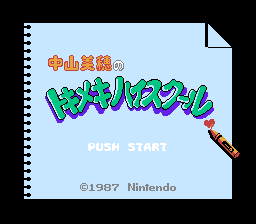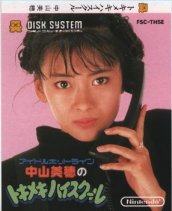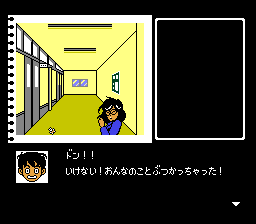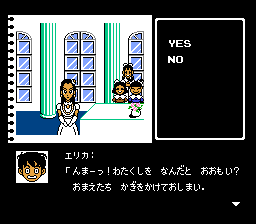
Even if you're not extremely into the weird side of video games, you might have heard of series like Konami's Tokimeki Memorial or Sakura Taisen. These games take the sort of standard adventure format and use it to make a simulation of your love life, starting at some arbitrary date (the first day of high school, maybe) and letting you loose to try to, um, you know, get a little closer to the girl of your dreams via conversations and actions. Of course there are obstacles like heartthrob guys who girls are instantly attracted to, and ugly or bossy girls who get in the way of the special thing you've got going.
The game begins with your character, whose family has just moved to the area, entering his new school for the first time. After class, you accidentially run into a conservative-looking girl wearing glasses. She introduces herself as Mizuho, but you can't help but notice her striking resemblance to your dream pop idol Cher (I mean Miho, of course). You pick up a good-luck charm Mizuho dropped to give back to her, then make a startling revelation - your photographer brother took a picture of Miho carrying the exact same charm!
What makes this game so much harder than others of its ilk is the complicated conversation system. In the music room you have to reveal to the girl that you know she's really an 80s Japanese pop idol, but you have to break the news lightly to her so she doesn't break down and leave the school. So, at each crossroads in your chat you can choose between three to four things to say. For example, you can be upfront and say "I know your secret, Miho" or beat around the bush and say "There's something really important I need to tell you". In addition, you sometimes can also choose what expression you make while you say your choice. Obviously apologizing to a girl while grinning wildly is a bad idea, but looking suitably sad could have a more desirable result. If your confession goes well with Miho, she'll ask you to keep her true identity a secret so she can continue going to a normal high school, and so the bizarre love story begins. Your high school is populated with the kind of characters that should be familiar to everyone - the domineering rich girl Erika and her entourage of giggling lackeys, your dopey friend Sadakichi who will never get a girl in his life, strict (but secretly perverted) teachers - and they all get in the way of your true love.
This is one hard conversation to get past - if you say one "wrong" thing, Miho breaks into tears and says that she "can't bear to see your face anymore" - Game Over. You're allowed infinite chances to complete the conversation, but after awhile you are reduced to trying out every option on the list, which is no fun at all. A woman's heart is a complex thing... This game was probably much more palatable in 1987. Miho-chan was actually a star at the time, for one (now she's Tiffany-level). More importantly, the game gives you phone numbers from time to time. These were real numbers, and you could call them to get hints, advance the plot, and hear Miho's sanguine voice. These numbers don't work anymore, of course (you can't even dial them; the area codes have changed), but I think it's a neat idea and I'm surprised other games haven't tried this out. Tokimeki High School is certainly worth trying out, at least. I'll wait to finish it until I find a walkthrough, though, as conversations near the end get quite frustrating. It's more linear than other Famicom adventures, and takes place in a more modern setting, allowing even beginning Japanese readers to understand it fairly easily from the start. This game was one of several Nintendo published on special blue disks, meant for use on the Disk Fax contest machines. Players who finished the game and entered the contest had a chance to win a special videotape and phone card set. Unlike the other FDS contest prizes I have never ever seen one of these. I'd chalk that up more to Famicom gamers not wanting to actually keep something like that than to any real "value" to collectors, though... 1999.5.16 Back.... | |||||||||||||||||||||||





